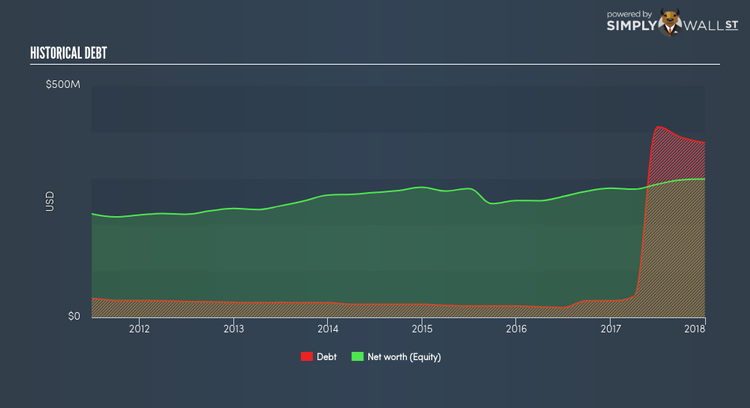Is Tennant Company (NYSE:TNC) A Financially Sound Company?

Tennant Company (NYSE:TNC) is a small-cap stock with a market capitalization of US$1.25B. While investors primarily focus on the growth potential and competitive landscape of the small-cap companies, they end up ignoring a key aspect, which could be the biggest threat to its existence: its financial health. Why is it important? Since TNC is loss-making right now, it’s crucial to understand the current state of its operations and pathway to profitability. Here are few basic financial health checks you should consider before taking the plunge. However, since I only look at basic financial figures, I suggest you dig deeper yourself into TNC here.
Does TNC generate enough cash through operations?
TNC has built up its total debt levels in the last twelve months, from US$36.19M to US$376.84M , which comprises of short- and long-term debt. With this growth in debt, TNC currently has US$58.40M remaining in cash and short-term investments for investing into the business. On top of this, TNC has generated US$54.17M in operating cash flow in the last twelve months, resulting in an operating cash to total debt ratio of 14.38%, meaning that TNC’s current level of operating cash is not high enough to cover debt. This ratio can also be a sign of operational efficiency for unprofitable businesses as traditional metrics such as return on asset (ROA) requires positive earnings. In TNC’s case, it is able to generate 0.14x cash from its debt capital.
Does TNC’s liquid assets cover its short-term commitments?
Looking at TNC’s most recent US$236.51M liabilities, it appears that the company has been able to meet these commitments with a current assets level of US$423.12M, leading to a 1.79x current account ratio. For Machinery companies, this ratio is within a sensible range as there’s enough of a cash buffer without holding too capital in low return investments.
Can TNC service its debt comfortably?
TNC is a highly-leveraged company with debt exceeding equity by over 100%. This is not uncommon for a small-cap company given that debt tends to be lower-cost and at times, more accessible. But since TNC is currently unprofitable, there’s a question of sustainability of its current operations. Maintaining a high level of debt, while revenues are still below costs, can be dangerous as liquidity tends to dry up in unexpected downturns.
Next Steps:
At its current level of cash flow coverage, TNC has room for improvement to better cushion for events which may require debt repayment. However, the company exhibits proper management of current assets and upcoming liabilities. Keep in mind I haven’t considered other factors such as how TNC has been performing in the past. I recommend you continue to research Tennant to get a better picture of the stock by looking at:
Future Outlook: What are well-informed industry analysts predicting for TNC’s future growth? Take a look at our free research report of analyst consensus for TNC’s outlook.
Valuation: What is TNC worth today? Is the stock undervalued, even when its growth outlook is factored into its intrinsic value? The intrinsic value infographic in our free research report helps visualize whether TNC is currently mispriced by the market.
Other High-Performing Stocks: Are there other stocks that provide better prospects with proven track records? Explore our free list of these great stocks here.
To help readers see pass the short term volatility of the financial market, we aim to bring you a long-term focused research analysis purely driven by fundamental data. Note that our analysis does not factor in the latest price sensitive company announcements.
The author is an independent contributor and at the time of publication had no position in the stocks mentioned.


